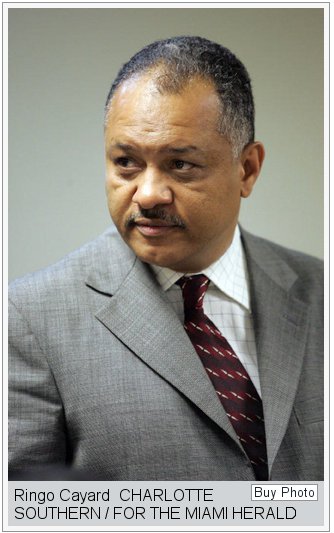
| dd |
|
Court case fizzles against one-time Haitian activist accused of racketeering
Ringo Cayard, once prominent in Miami’s Haitian community, is likely to avoid trial on multiple grand theft and racketeering charges tied to his former nonprofit organization.
By Nadege Green
ngreen@MiamiHerald.com
A once-powerful Haitian political activist who faced multiple charges of racketeering, grand theft and money-laundering will get off with a much lighter sentence.
Ringo Cayard, former executive director of the now-defunct Haitian American Foundation Inc., a nonprofit organization, is awaiting a court hearing that will allow him to enter a pre-trial diversion program, essentially avoiding prosecution in exchange for community service.
Cayard was arrested in 2008 and charged with 20 counts of grand theft, money-laundering and racketeering after he allegedly pocketed thousands of dollars from Miami-Dade County grants intended for the foundation.
All but three grand theft charges have been dropped by the Miami-Dade State Attorney’s Office, according to court records.
 The unraveling of the case stems from key witnesses changing their statements to prosecutors, according to Ed Griffith, a spokesman for the state attorney’s office.
The unraveling of the case stems from key witnesses changing their statements to prosecutors, according to Ed Griffith, a spokesman for the state attorney’s office.
"When you have your witnesses change testimony, cases fall apart," Griffith said. "It really is that simple."
Former foundation board members Andre Joseph, Jean Alisma and Jean Bazile — all of whom were scheduled to testify at Cayard’s trial — backtracked from their original statements, which prosecutors had counted on to bolster their case, Griffith said.
In the past, Cayard has denied any wrongdoing.
Cayard declined to comment for this article. His attorney Ben Kuehne did not return calls for comment.
At the time of his arrest in 2008, Cayard was accused, among other charges, of faking the foundation’s board minutes to pay himself a $300,000 bonus for negotiating the sale of a 2.4-acre lot on which a Creole Market was planned but never built.
Instead, the foundation sold the land for $2 million — after buying it with $210,000 in grants from the county and the city of Miami. City and county leaders demanded that the foundation repay them the $1.8 million profit. The foundation refused.
Prosecutors also alleged Cayard siphoned thousands of dollars from Miami-Dade County contracts for staging festivals and giving meals to the elderly.
Cayard and his family have deep roots in the Haitian-American community.
His family founded a well-known Haitian market and bakery in Little Haiti, and are considered early pioneers of South Florida’s community of Haitian immigrants.
But Cayard himself has been an often-polarizing figure, at once lauded and criticized for his role as a political kingmaker who hobnobbed with local leaders — he was, for example, a political ally to former Miami Mayor Manny Diaz and former County Commissioner Dorrin Rolle.
He gained further prominence at the height of the foundation’s work, which as a leading social service agency provided much-needed services to the elderly.
When Cayard was arrested, some well-known members of the Haitian community such as singer Farah Juste spoke out in his defense.
Cayard, who for decades had been a prominent voice in local Haitian politics, has been largely out of the limelight since his arrest.
Now, few are willing to speak publicly about him even though the criminal case against him has fizzled.
Cayard has not yet been approved to enter the pretrial diversion program. A Miami-Dade Circuit Court judge will determine at an Oct. 5 hearing whether the program is appropriate.
The pre-trial diversion program is available only to first-time offenders. In exchange for 100 hours of community service or 50 hours of community service and $10,000 in restitution, Cayard’s three grand theft charges would be dropped upon the completion of the program.
Miami Herald Staff Writer Scott Hiaasen contributed to this report.
